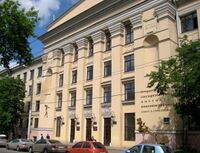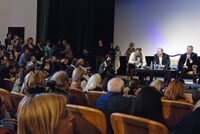Organization:Gerasimov Institute of Cinematography
Всероссийский государственный институт кинематографии имени С. А. Герасимова (ВГИК) | |
 | |
Former names | All-Union State Institute of Cinematography; Всероссийский государственный институт кинематографии имени С. А. Герасимова |
|---|---|
| Type | Film school |
| Established | 1919 (by Vladimir Gardin) |
| President | Alexander Novikov |
| Rector | Vladimir Malyshev |
Academic staff | c. 200 |
| Location | , Russian Federation , |
| Campus | Urban |
| Website | vgik.info (in Russian language) |
The Gerasimov Institute of Cinematography, officially the S. A. Gerasimov All-Russian University of Cinematography (Russian: Всероссийский государственный институт кинематографии имени С. А. Герасимова, romanized: Vserossiyskiy gosudarstvyennyy institut kinematografii imyeni S. A. Gerasimova, meaning All-Russian State Institute of Cinematography named after S. A. Gerasimov), a.k.a. VGIK, is a film school in Moscow, Russia .[1][2]
History
The institute was founded in 1919 by the film director Vladimir Gardin as the Moscow Film School and is the first and oldest film school in the world.[3] From 1934 to 1991 the film school was known as the All-Union State Institute of Cinematography (Russian: Всесоюзный государственный институт кинематографии).
Film directors taught at the institute include Lev Kuleshov, Marlen Khutsiev, Aleksey Batalov, Sergei Eisenstein, Mikhail Romm and Vsevolod Pudovkin.
Since 1986, the school has been named after the film director and actor Sergei Gerasimov.
The founding of the institute was authorized by V. I. Lenin in 1919. Its work in the early years was hampered by a shortage of film stock. It has a history as one of the oldest film schools in existence; many film directors have taught at the institute. During the period of the Soviet Union it was a requirement of the state to attend VGIK in order to be allowed to direct a film. [citation needed]. More recently, its alumni were drawn both from the USSR (Soviet Union) and from other socialist and other countries, though it was a requirement for students to first learn Russian prior to attending. It is among the few film schools which offer scriptwriting courses.[4]
Notable alumni
Notable alumni include:
- Tengiz Abuladze
- Sitora Alieva
- Dhimitër Anagnosti
- Natalya Andrejchenko
- Anders Banke
- Siddiq Barmak
- Aimée Beekman[5]
- Vladimir Beekman[5]
- Sergei Bondarchuk
- Lucian Bratu
- Valentin Chernykh
- Sofiko Chiaureli
- Revaz Chkheidze
- Grigory Chukhray
- Yuri Chulyukin
- Souleymane Cissé
- Frank Daniel
- Georgi Djulgerov
- Maciej Drygas
- Dimitri Devyatkin
- Nikolai Ekk
- Natalya Fateyeva
- Yan Frid
- Aleksandr Fyodorov
- Leonid Gaidai
- Aleksei Alekseivich German
- Marina Goldovskaya
- Anatoli Golovnya
- Stanislav Govorukhin
- Zheng Guo'en
- Lyudmila Gurchenko
- Iris Gusner
- Alexander Gutman
- Jerzy Hoffman
- Rustam Ibragimbekov
- Otar Iosseliani
- Roman Karmen
- Shapi Kaziev
- Edmond Keosayan
- Ilya Khrzhanovsky
- Marlen Khutsiev
- Naum Kleiman
- Elem Klimov
- Andrei Konchalovsky
- Alim Kouliev
- Larisa Kronberg
- Lev Kulidzhanov
- Eldar Kuliev
- Tamila Koulieva-Karantinaki
- Savva Kulish
- Leida Laius
- Anton Lapenko
- Pavel Lebeshev
- Jay Leyda
- Roman Liberov
- Việt Linh
- Sergei Loznitsa
- Oleg Makara
- Mohammad Malas
- Vladimir Menshov
- Rachel Messerer
- Márta Mészáros
- Nikita Mikhalkov
- Aleksandr Misharin
- Alexander Mitta
- Kira Muratova
- Vladimir Nakhabtsev
- Rodion Nakhapetov
- Khodzha Kuli Narliyev
- Georgy Natanson
- Rufina Nifontova
- Mikko Niskanen
- Rashid Nugmanov
- Arsha Ovanesova[6]
- Yuri Ozerov
- Sergei Parajanov
- Aleksandr Petrov
- Juris Podnieks
- Gennadi Poloka
- Galina Polskikh
- Ami Priyono
- Vsevolod Pudovkin
- Andres Puustusmaa
- Irma Raush
- Eduard Rozovsky
- Eldar Ryazanov
- Samson Samsonov
- Abderrahmane Sissako
- Mikhail Schweitzer
- Karen Shakhnazarov
- Giorgi Shengelaia
- Eldar Shengelaya
- Larisa Shepitko
- Vasily Shukshin
- Sjumandjaja
- Lyubov Sokolova
- Aleksandr Sokurov
- Elena Solovey
- Sergey Solovyov
- Sjumandjaja
- Andrei Tarkovsky
- Viktoriya Tokareva
- Alexei Uchitel
- Jonas Vaitkus[7]
- Mikhail Vartanov
- Natalya Vavilova
- Luz Valdez
- Oleg Vidov
- Gheorghe Vodă
- Eduard Volodarsky
- Konrad Wolf
- Francheska Yarbusova
- Valentina Yermolova
- Vadim Yusov
- Vytautas Žalakevičius
Faculty
File:VGIK Lighting 3 - Stairs.webmhd.webm
In 2015-2016, the Institute featured the following faculties:
- Directing Faculty
- Acting Faculty
- Arts Faculty
- Filming Faculty
- Animation and Multimedia Faculty
- Scripting and Film Studies Faculty
- Production and Economics Faculty
- Inter-faculty departments and labs:
- Department of History and Philosophy
- Department of Cultural Theory, History and Esthetics
- Laboratory of Film Drama
- Laboratory of Painting and Drawing
- Laboratory of Arts
- Laboratory of International Film History
- Laboratory of Classical and Stop-motion Animation
- Laboratory of Computer Graphics and Multimedia
References
- ↑ Tatiana Smorodinskaya, Karen Evans-Romaine, Helena Goscilo (2013). Encyclopaedia of Contemporary Russian Culture. Routledge. p. 15-16. ISBN 978-1136787867.
- ↑ Peter Rollberg (2009). Historical Dictionary of Russian and Soviet Cinema. US: Rowman & Littlefield. pp. 735–736. ISBN 978-0-8108-6072-8.
- ↑ "Error: no
|title=specified when using {{Cite web}}" (in ru). Gerasimov Institute of Cinematography. http://www.vgik.info/index.php?id=historyinformation. - ↑ Bawden, Liz-Anne, ed. (1976) The Oxford Companion to Film. Oxford University Press; ISBN:0-19-211541-3; p. 729
- ↑ 5.0 5.1 Imre, Anikó (2012). A Companion to Eastern European Cinemas. John Wiley & Sons. p. contents. ISBN 978-1118294352. https://books.google.com/books?isbn=1118294351. Retrieved 25 June 2014.
- ↑ "Арша Ованесова". https://www.kino-teatr.ru/kino/director/sov/30353/bio/.
- ↑ (in Lithuanian) PERSONALIJA -Jonas VAITKUS. Lithuanian National Drama Theatre
External links
| Wikimedia Commons has media related to Gerasimov Institute of Cinematography. |
- vgik.info, Gerasimov Institute of Cinematography's official website (in Russian language)
- vgik.livejournal.com, Gerasimov Institute of Cinematography's student community (in Russian language)
[ ⚑ ] 55°50′06″N 37°38′15″E / 55.835°N 37.6375°E
 |




